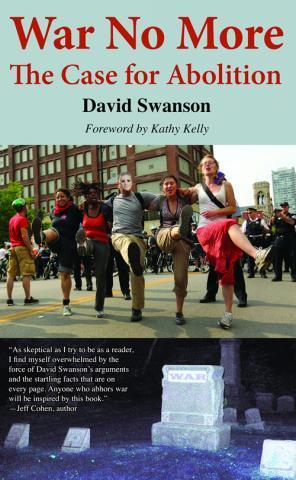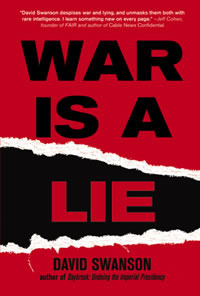David Swanson's Blog, page 134
September 15, 2013
Admit It: Things Are Going Well
When something goes right
Oh, it's likely to lose me
It's apt to confuse me
It's such an unusual sight
—Paul Simon
Larry Summers has proven unacceptable to oversee the continued destruction of the U.S. economy. The U.S. public has successfully rejected proposed missile strikes on Syria. My Congressman was among the majority who listened. Today was beautiful. The Orioles won. The Cowboys lost. The University of Virginia avoided losing by not playing. My family is expecting a new baby. I've finished a new book, which Kathy Kelly has written a beautiful foreword for. I have a sense that if the universe were right now campaigning on "hope and change" I might seriously consider voting for it.
I'm also pretty sure that if everything in my personal life were going slightly to hell and Larry Summers were crowned king of Wall Street, and the Dallas Cowboys were to win (darn them!), my sense of this moment in the movement against U.S. militarism would remain essentially the same. A major victory has been won, and we need to claim it and celebrate it.
Imagine the euphoria -- or don't imagine it, just remember it -- when this country elects a new president whose main redeeming feature is that he isn't the previous president. For personality fanatics that's big stuff. And there are big parties. For policy fanatics -- for those of us interested in seeing policies change rather than personalities -- that kind of moment is right now. We need some parties, and if spontaneity is beyond us, perhaps we can use the International Day of Peace on September 21st for a combination celebration / discussion during which we explain to ourselves that it really is OK to celebrate.
Yes, many people in this country and around the world are suffering horrible tragedies in their personal lives and as a result of public events. Yes, the horrors in Syria, as in many other places, continue. Yes, the CIA is arming terrorists in Syria. Yes, the president whose missile strikes we prevented is taking credit for that restraint, just as he would have taken credit for the carnage had we not stopped him -- and he's threatening to bring the missile strikes back. Yes, if we let down our guard for a moment, the president and Congress and the CIA will do their worst. Yes, the danger for Iraq and Libya really loomed large after they had given up nuclear and chemical weapons, not before. Yes, lots of people opposed bombing Syria because they didn't think Syrians deserved such favors. (No, I'm not making that up.) Yes, the corporate media is pretending that the threat of war brought peace, ignoring the successful insistence on peace by the people of the world.
But that's why we have to celebrate what really happened. We have to announce it. The point is not to take credit. No one person or group did this. People espousing a variety of ideologies did it. And they did it over many years. Millions contributed. The point is that war was popularly rejected.
Why does this matter? It's not a case for optimism, or for pessimism. I continue to have very little use for either bit of self-indulgence. The forces that press for more wars have not gone away. Neither have they been empowered. The point is that those who nonsensically proclaim that stopping wars is impossible cannot get away with saying that anymore.
You know the types. They show up at meetings, wait for the question-and-answer period, and then give a speech on how everything is utterly hopeless. Those speeches should be laughed away within the first five seconds now. And the many, many people who had begun ever so slightly to take that defeatist nonsense seriously can now be relieved of that weight. The danger now is not of being a sucker who proclaimed good news just before a genocide. The danger is of joining in the foolish campaign of the war propagandists by pushing the lie of powerlessness on people just after they prevented a war.
Do we still have to prevent a war again this week? Of course, we do. Do we have to take on the larger task of organizing peace and preventing crises? We do. Do we need to build a movement for the abolition of war that reaches beyond opposition to each immediate war proposal? You'd better believe it. But this is what we wanted in 2001 and 2003. Well, some of us did -- that's the point. We're larger now, even if it's not made visible. As long as we went on failing to prevent wars, people could say we'd never prevent them. There's no science or logic behind such an assertion, but it still has power in it. Or it did, until now. Now we can claim with equal validity that we'll stop every single war proposed from here on out. Of course we might or we might not, but we know that it's up to us, that it depends on what we do, that little steps that appear useless at the time can help, and that changes to our culture can outweigh changes to the Pentagon budget, the global climate, crises in capitalism, or any other supposedly unstoppable force.
After World War I, people in the United States understood the need to eliminate war. Again, after Vietnam, many understood it almost that much. They developed the Vietnam Syndrome, a level of healthy resistance to more wars lamented as a disease by Washington. Now we're moving back in that direction. War resistance is the health of the people. We're not developing a syndrome. We're developing an immunity. We've been vaccinated against war. We're not as allergic to the propaganda as we once were. We're war resistant, and our task is to compel those in power not to lament our syndrome this time, but to share in our contagious good health.
September 14, 2013
Occupy Radio on Syria
September 13, 2013
New Book: WAR NO MORE: The Case for Abolition

A new book is about to be released by David Swanson, with a foreword by Kathy Kelly.
This book presents what numerous reviewers have called the best existing argument for the abolition of war, demonstrating that war can be ended, war should be ended, war is not ending on its own, and that we must end war.
The PDF is here for $2:
The paperback is being produced by LightningSource.com and should be available here and at all the usual online and real world book sellers soon. (184 pages, list price $15 US)
The eBooks of every variety are being produced by eBookIt.com and should be available here and through all the usual sellers soon.
The audio book is being produced by the author and should be available here and through all the usual sellers soon.
Advance Praise for War No More:
“As skeptical as I try to be as a reader, I find myself overwhelmed by the force of David Swanson’s arguments and the startling facts that are on every page. Anyone who abhors war will be inspired by this book.” —Jeff Cohen, author
“Once again, David Swanson punctures our cultural myths about war in a way that is powerful, compelling, and irrefutable.” —Thom Hartmann, author and radio/television host
“This book gives hope that the culture and mindset of militarism, killing, and war can indeed be changed to a culture of peace and nonviolence, and war can be abolished.” —Mairead Maguire, Nobel Peace Laureate
“This book concisely makes the simple case that war should and can be eliminated from the face of the earth. As a quick read for people who already oppose war but need education and talking points—or as a clincher for those who are still struggling to overcome a lifetime of war propaganda—this book should become a critical and powerful tool for the anti-war movement.” —Nicolas Davies, author
“With logic and passion, David Swanson makes a compelling, eloquent case for what is, or should be, the great moral mission of our era: ending war.” —John Horgan, science writer
“Eugene Debs comes to mind when I think of Swanson’s energy and skill for communicating about abolition of war.” —Kathy Kelly, peace activist
“Do you think that humankind can ever eliminate war? David Swanson makes perhaps as good an argument for the affirmative as can be found. Think of the death penalty. Once considered critical to our security, the death penalty is now universally considered optional and widely considered archaic, counter-productive, and shameful. To an even greater extent, this has been the fate of slavery. Why should war not suffer the same destiny?” —William Blum, author
“David Swanson does it again. Yet another tour de force against war and for peace. This book is required reading for everyone in the Peace Movement. As Swanson argues, we must abolish war before war abolishes us. There will be no International War Criminals Tribunal after World War III. Swanson’s book is a Beacon of Hope to a frightened and paralyzed Humanity.” —Francis A. Boyle, professor
“War No More reminds us that war abolition can be as successful as was slavery abolition—once we recognize that wars are made by societies that tolerate war, and that wars can be avoided by a cultural rejection of war. As long as Americans feel helpless about their ability to have an impact on the U.S. government, wars will continue, but Swanson’s book and his life are antidotes to American helplessness.” —Bruce E. Levine, author
“The ideas in this book have truly opened up a new way for me to think about war; or, to be more specific, ending it.” —Sean McCord, playwright
“I am always impressed and inspired by David’s prolific energy and I admire his unwavering opposition to all war, not just the ones started or continued by Republicans. In War No More, David once again lays out an impeccable case for abolishing war as a tool of Empire.” —Cindy Sheehan, author and peace activist
“Living in the most militarized culture on earth, we can get trapped into thinking that our choices are limited to going to war or doing nothing. In War No More, David Swanson completely destroys this deadly myth. He convincingly and passionately shows there are many options available to our enormously creative minds once we decide war is not an option of last resort—it is no option at all. —Mike Ferner, former president, Veterans For Peace
“David Swanson writes like he talks; that is to say, in clear, sharp language that gets to the root of the issue, but in a very personal way...as if you are having a one-on-one conversation with him. As a natural follow-on to Swanson’s previous books about war, War is a Lie, and When the World Outlawed War, he brings us to the logical next step: ending war. Swanson shows us that abolishing war is not unfathomable, but that it will take more than just a change in mindset; it will take real action and real work--a movement. Count me in.” —Leah Bolger, former president, Veterans For Peace
“Long ago, abolitionists caused huge discomfort. They still do. The work of David Swanson is in the vital spirit of William Lloyd Garrison, who had a clear answer when a friend urged him to keep more cool because he seemed on fire. ‘I have need to be all on fire,’ Garrison replied, ‘for there are mountains of ice around me to melt.’ Swanson’s new book War No More generates an abundance of heat and light. It will serve as a powerful blowtorch for efforts to abolish war.” —Norman Solomon, author
From the Introduction:
As I write this, in September 2013, something extraordinary has just happened. Public pressure has led the British Parliament to refuse a prime minister’s demand for war for the first time since the surrender at Yorktown, and the U.S. Congress has followed suit by making clear to the U.S. president that his proposed authorization for war on Syria would not pass through either the Senate or the House.
Now, this may all fall apart in a week or a month or a year or a decade. The forces pressing for a war on Syria have not gone away. The civil war and the humanitarian crisis in Syria are not over. The partisan makeup of the Parliament and the Congress played a role in their actions (although the leaders of both major parties in Congress favored attacking Syria). Foreign nations’ intervention played a role. But the decisive force driving governments around the world and U.S. government (and military) insiders to resist this war was public opinion. We heard the stories of children suffering and dying in Syria, but we rejected the idea that killing more Syrians with U.S. weapons would make Syria better off.
Those of us who believe that we should always have the right to reject our government’s arguments for war should feel empowered. Now that it’s been done, we cannot be told it’s impossible to do it again ... and again, and again.
In the space of a day, discussions in Washington, D.C., shifted from the supposed necessity of war to the clear desirability of avoiding war. If that can happen once, even if only momentarily, why can it not happen every time? Why cannot our government’s eagerness for war be permanently done away with? U.S. Secretary of State John Kerry, who led the unsuccessful marketing campaign for an attack on Syria, had famously asked, many years earlier, during what the Vietnamese call the American War, “How do you ask a man to be the last man to die for a mistake?” We have it within our power to make war a thing of the past and to leave Secretary Kerry the last man to have tried to sell us a dead idea.
(An argument will be made that the threat of war aided diplomatic efforts to disarm the Syrian government. It should not be forgotten that when Kerry suggested that Syria could avoid a war by handing over its chemical weapons, everyone knew he didn’t mean it. In fact, when Russia called his bluff and Syria immediately agreed, Kerry’s staff put out this statement: “Secretary Kerry was making a rhetorical argument about the impossibility and unlikelihood of Assad turning over chemical weapons he has denied he used. His point was that this brutal dictator with a history of playing fast and loose with the facts cannot be trusted to turn over chemical weapons, otherwise he would have done so long ago. That’s why the world faces this moment.” In other words: stop getting in the way of our war! By the next day, however, with Congress rejecting war, Kerry was claiming to have meant his remark quite seriously and to believe the process had a good chance of succeeding.)
In this book I make the case outlined in the four section titles: War can be ended; War should be ended; War is not going to end on its own; We have to end war.
September 10, 2013
In Raleigh NC on 9/28 March for Our Planet
Join my awesome neice and nephew in Raleigh for this incredible event! --DS
March for Our Planet
September 28, 2013, 3:30 pm in Raleigh, NC

Sharing flyers about the March for Our Planet
On September 28, 2013, young people around the world will lead marches, rallies, and demonstrations to call attention to climate change and to ask our leaders to make protecting our planet a top priority. Events will be planned and led by youth but all are welcome and encouraged to attend.
In North Carolina, youth will lead a march and rally in downtown Raleigh with inspiring calls to action from youth leaders and climate advocates. Marchers will meet at Halifax Mall at 3:30 pm for a welcome and activities. The march will begin at 4:00 pm, circling the Capitol and the General Assembly building before returning to Halifax Mall for a program to include speakers, music, and more. More details about march location and logistics to come.
Click here for ways to get involved!

The Triangle Raging Grannies will perform at the post-march rally
The March for Our Planet is endorsed by
350.org Boone
350.org Triangle
350.org Winston Salem
Climate Convergence NC
iMatter Youth/Kids vs. Global Warming
League of Conservation Voters
NC Interfaith Power and Light
NC Students for Climate Action
Our Children’s Trust
Southern Energy Management
The Other Super Power Is Winning
It's not Russia. It's not al Qaeda. It's not Bashar al-Assad. The other super power is the people of the world -- and the people of, but not by or for, the United States.
The world's people are protesting. U.S. citizens abroad are protesting at U.S. embassies. The British Parliament said no to war for the first time since Yorktown.
The U.S. polls began with single-digit support for attacking Syria, climbed a little with the corporate media onslaught, and then started sinking again as the propaganda push shifted into self-defeating top gear.
Taking the stage after Colin Powell, the Obama-Kerry war marketing team was compelled by public pressure, foreign pressure, government-insider pressure, past public statements, and the inability of even the corporate media to keep a straight face, to take this war proposal to Congress -- and to do so while Congress members and senators were at home in their districts and states, where people were able to get in their faces.
Congress has been feeling the heat. Sure, there is greater willingness by some Republican members to oppose a war if the president is a Democrat. But there are also Democrats openly supporting the war because the president wants them to. The decisive factor has been public pressure. Senators and representatives have been turned around by their constituents, and that minority still supporting an attack on Syria openly says they're defying the people who elected them. If there is no vote in Congress, it will be because the vote would fail.
Now is the time for Congress and the president to hear our voices more loudly than ever.
Secretary Kerry stressed on Monday that he hadn't been serious about a diplomatic solution. It was just "rhetoric." He was just pointing out the "impossibility" of Assad handing weapons over. He didn't want anyone to take it seriously. Not when we have to get a war started. Not when the clock is ticking and he has already Colin-Powelled himself in front of his old committee with his wife behind him and protesters with bloody hands filling the room and everybody snickering when he claimed al Qaeda would install a secular democracy. Not after all THAT!
How can you ask a man to be the last one to lie for a dead idea?
But warmongering senators and presidents and presidential wannabes jumped at the chance of a way out of watching Congress vote down a war, and watching Congress vote down a war because we made them do it. Democratic Congresswoman Barbara Lee has a proposal for a diplomatic resolution. Republican Congressman Chris Smith has proposed a United Nations war crimes tribunal. (One might hope it will even look at the crimes of both sides in the Syrian war.) The always obvious, but hidden, fact that there are alternatives to bombing people is bursting out all over.
Sure, some people dislike this war because it would cost money, or because the Iraqis are ungrateful for the destruction of their country, or because Obama was born in Africa, but mostly people oppose this war for very good reasons -- and the financial cost is not really a bad reason. From right to left, people don't think the United States should be the world's vigilante. From left to right, people don't believe the justifications presented without evidence. From right to left, people understand that killing people with the right weapons to protest their being killed with the wrong weapons is little bit crazy. From left to right, people don't believe tales of short and easy wars that will pay for themselves. And, across the political spectrum, people have begun to be able to smell lies, even when those lies are wrapped in flags and uniforms.
We should give our government credit for listening -- if it listens. By no means are we out of the woods yet. If you want to be able to say you were part of the movement that prevented a U.S. war, now is the time to email and telephone and join in activities. We should not, however, fantasize that our government secretly held our position against the war it was trying to roll out, before we compelled it to hold our position.
Let them thump their chests a bit about how their threats won something out of Assad, if that allows their war fever to pass. But don't for a minute lose the significance of what the U.S. public has done to the otherwise broken U.S. government. Out of whatever combination of factors, it just may turn out that we've stopped a war. Which means that we can stop another war. Which means that we can begin to work our way out of the war machine that has eaten our economy, our civil liberties, our natural environment, and our soul.
Assad may be lying. Or Obama may lie that Assad is lying. Or this whole thing may otherwise fall apart and the push for this war be back with a full-court press on Congress. But we can stop it if we choose to do so. We can push as hard for peaceful solutions in Syria as we've pushed to prevent the bombs from falling. In fact, we can push 10 times harder.
And the warmakers will be back with another war. Have no fear of that. Seriously, have no fear of it: We are a super-power. They are a vestige of a barbaric practice that has become an anachronism even while remaining our largest public investment. They are dinosaurs. They'll come back with a "defensive war". That was their biggest failure this time; they didn't make Syria a threat. Senator Harry Reid on Monday painted Syria as Nazi Germany, but he sounded like Elmer Fudd warning of a killer rabbit.
Laughter is our most potent tool. We must mock their fear-mongering. We must laugh at their claims of power and benevolent intent. We must ask to see the list of nations that are grateful for past bombs. We must inquire whether senators who play video poker while debating war plans, or secretaries of state who promise wars that will be both tiny and significant with no impact and a decisive result, are perhaps in need of better medication.
But let's not count our doves before they hatch. Get in on this successful movement now. It's going to be one to tell your grandchildren about.
September 9, 2013
Kerry Couldn't Sell a Used Car
After Secretary of State John Kerry suggested that President Bashar al-Assad avoid a war by handing over any chemical weapons his government possesses, Russia quickly seconded the motion, and Assad agreed to it. Just as quickly, aparently panicked by the possible delay or prevention of missile strikes, Kerry's staff put out this statement:
Join Me at the Festival for Peace, Prosperity, and the Planet in Nashville on Sept. 21
 The Festival for Peace, Prosperity, and the Planet will be held 11am to 6pm Saturday, September 21, 2013 at the "Special Events Pavilion" in Centennial Park. That's in the northwest corner of the park, near the airplane and the locomotive (see green arrow on the map linked here). Admission to this event is FREE. We'll have speakers, music, exhibitors, and vendors. Come rain or shine -- we have a roof!
The Festival for Peace, Prosperity, and the Planet will be held 11am to 6pm Saturday, September 21, 2013 at the "Special Events Pavilion" in Centennial Park. That's in the northwest corner of the park, near the airplane and the locomotive (see green arrow on the map linked here). Admission to this event is FREE. We'll have speakers, music, exhibitors, and vendors. Come rain or shine -- we have a roof!
Speakers will include David Swanson (peace writer), Hector Black (advocate for peace and forgiveness), Paki Wieland (Gaza flotilla, Raging Grannies), Linnet Overton (Community Food Advocates), and Diane Wilson (Code Pink). Musical performances will include Cobalt Blue and the Shelby Bottom String Band. We're still looking for exhibitors and vendors; contact Eric Schechter (LeftyMathProf@gmail.com) regarding those, or regarding other aspects of the festival.
(There will also be a fundraiser dinner on the preceding evening, at the Nashville Peace and Justice Center, to help pay for the festival.)
September 7, 2013
This War Too Is A Lie
 Some smart people thought, and perhaps some still think, that the 2003-2011 war on Iraq was unique in that it was promoted with the use of blatant lies. When I'd researched dozens of other wars and failed to find one that wasn't based on a foundation of similar lies, I wrote a book about the most common war lie varieties. I called it War Is A Lie.
Some smart people thought, and perhaps some still think, that the 2003-2011 war on Iraq was unique in that it was promoted with the use of blatant lies. When I'd researched dozens of other wars and failed to find one that wasn't based on a foundation of similar lies, I wrote a book about the most common war lie varieties. I called it War Is A Lie.
That book has sold more than any of my others, and I like to think it's contributed some teeny bit to the remarkable and very welcome skepticism that is greeting the U.S. government's current claims about Syria. The fact is that, were the White House telling the truth about the need for an attack on Syria, it would be a first in history. Every other case for war has always been dishonest.
The United States sought out war with Mexico, not the reverse. There was never any evidence that Spain sank the Maine. The Philippines didn't benefit from U.S. occupation. The Lusitania was known to be carrying troops and arms. The Gulf of Tonkin incident never happened. Iraq didn't take any babies out of incubators. The Taliban was willing to turn bin Laden over to be tried in a neutral court. Libya wasn't about to kill everyone in Benghazi. Et cetera. Even wars that people like to imagine as justified, such as World War II, were nonetheless packaged in lies; FDR's tales about the Greer and the Kearney and supposed secret Nazi maps and plans were a step on the steady trajectory from Woodrow Wilson to Karl Rove.
The idea that Syria used chemical weapons is more plausible than the idea that Iraq had vast stockpiles of chemical, biological, and (in some versions) nuclear weapons and was working with al Qaeda. But the evidence offered in the case of Syria is no stronger than that for Iraq. It's harder to disprove merely because there's nothing to it: no documentation, no sources, no science. Congress members who have seen the classified version say it's no better than the declassified. Experts within the government and reporters in Syria who have seen more than that say they don't believe the White House's claims. The assertions masquerading as a case come packaged in dishonest claims about how quickly Syria gave access to inspectors, and are written in a manner to suggest far greater knowledge and certainty than they actually assert on careful examination. The latest claims follow a series of failed claims over a period of months and stand to benefit a Syrian opposition that has been found repeatedly to be manufacturing false propaganda aimed at bringing the United States into the war. It seems, at this point, unlikely that the Assad government used chemical weapons two weeks ago, and already certain that even if it did, President Obama and Secretary Kerry don't know it -- they've only guessed it at best.
The debate over chemical weapons, itself, is framed by the lie that a law against chemical weapons can be enforced by one nation attacking another. In fact, Syria is not a party to the Chemical Weapons Convention. If it were, it would be subject to prosecution in court. In any event, it is subject to the judgment and action of the world and its courts, not of one vigilante representing 4% of the world. The bizarre idea that bombing a country can be a form of law enforcement dishonestly hides the fact that the action itself violates the U.N. Charter and the Kellogg Briand Pact.
Wars, a central lie maintains, are fought against evil. But Assad is not the devil incarnate. He's a horrendously awful ruler, pushed in bad directions by those around him as much as they by him. He's someone who has proposed disarmament in the past and been rejected by the United States. He's someone who has done evil things in cooperation with the United States, including lawless imprisonment and torture. He's not going to eat American children in their sleep. He's never threatened the United States, and has shown remarkable restraint in the face of threats by the United States and the CIA's efforts to undermine and attack his government. Residents of the United States in search of dangers to get excited about shouldn't arrive at Bashar al Assad until far, far down the list past poor diet, poor healthcare, lack of exercise, automobiles, obesity, industrial pollution, unsafe workplaces, gun accidents, chain saws, lightning strikes, and countless other causes of death.
Wars, a common lie holds, are fought in defense. But Syria is no threat to the United States, and when President Obama suggests that theoretically it could be, the laughter you hear from most listeners is the correct response. The White House hasn't sought to build much of a case for "defensive war" against Syria, even on the Benghazi model, and that deficiency is a major weakness. Most people have no tolerance for non-defensive wars. Exceptions are sadists and believers in humanitarian bombings, or -- to name a category that encompasses both of those groups -- imperialists.
The Syrian government is, like any government the United States wants to attack, a brutal government that the United States worked with until recently, situated in a region full of brutal governments the United States still supports. In this case, the brutal governments still armed and supported by the U.S. government include Bahrain, Saudi Arabia, Egypt, Jordan, Israel, and Yemen. If the US. government wanted to reduce violence, it could end its 2001-begun war on Afghanistan, it could end its drone strikes, and it could stop supplying Saudi Arabia with cluster bombs and Egypt with tear gas and Bahrain with ex-police chiefs. Wars are not driven by generosity, despite what you'll often -- and increasingly -- hear.
We've also been hearing that President Obama has no choice. He's painted himself into a corner. War simply must happen now, for better or worse. This is nonsense, of course. If Kennedy could back off from a nuclear pissing match with Khrushchev, then surely Obama can accede to the opinion of the United States and the world on the matter of Syria. Had Kennedy prioritized stupid machismo, we wouldn't admire him more. We wouldn't do anything at all. We'd all be dead or never born. Wars, despite a common lie, are not inevitable.
Violence doesn't reduce violence, despite the prevalence of this lie. Wars are not ended by enlarging them. Adding violence to the Syrian civil war will kill directly, escalate the killing by both sides, risk further escalation into a regional conflict, exacerbate a refugee crisis, damage existing aid operations, and make a cease-fire and negotiations more difficult. Killing some Syrians and blowing up some Syrian buildings will leave Assad with exactly whatever "impunity" he had before -- particularly if no nations pursue his indictment in any court for any crimes. But those Syrians killed and everyone else impacted indirectly will be worse off, not better.
 As war drags on and expands, the arguments for continuing it will be retaliation against the attacks of other nations, even if our nation provoked them, and the almost religious duty to "support the troops." But the dirty little secret hidden by that shiny lie is that the troops don't benefit from adding years to each quagmire. The troops, in fact, suffer -- often severely. Wars are not prolonged for the good of soldiers, no matter what your television says. They're prolonged for politicians and profiteers.
As war drags on and expands, the arguments for continuing it will be retaliation against the attacks of other nations, even if our nation provoked them, and the almost religious duty to "support the troops." But the dirty little secret hidden by that shiny lie is that the troops don't benefit from adding years to each quagmire. The troops, in fact, suffer -- often severely. Wars are not prolonged for the good of soldiers, no matter what your television says. They're prolonged for politicians and profiteers.
The beneficiaries of a U.S. attack on Syria will be war profiteers, their political servants, media outlets that gain higher ratings, and a gang increasingly dominated by al Qaeda-affiliated groups that is seeking power in Syria through the use of vicious violence that is illegal in its entirety. War makers do not have noble motives.
A U.S. war on Syria, short or long, will not be fought by armies on a battlefield. It will be fought by missiles and planes and drones in and above the neighborhoods where men, women, and children live. The human, societal, and environmental damage will be something that too many parts of the world are familiar with but the United States itself is not.
This war, like others of its sort, will not be won. Syria was not going to be the first case in which a war was based on honesty. It's also not going to be the first place where a humanitarian war benefits humanity. It's not going to be the first place where the U.S. military builds a stable democratic nation. It's not going to be the first nation whose people are grateful for such an intervention. And it's not going to involve anything that could be properly called a victory.
The deepest lie at the route of this drive for war is perhaps the lie that a nation can prepare for war, dumping its energies and resources into every possible plan for every conceivable war, and yet manage to avoid those wars unless they are forced upon it as a "last resort." This next dishonest, immoral, illegal, unpopular, murderous, atrocity-laden, uncontrollable, environment-destroying, rights-eroding, money-wasting war will come relentlessly, ineluctably, it will come . . . unless we compel our government to consider other possible courses of action, including that of actively working for peace through a posture of respect for others that would require a bit of truthfulness.
September 6, 2013
The Bill Congress Should Pass Instead of War
Here's a preliminary draft of what the United States Congress could pass this week if it were sincerely interested in human rights, international norms, the rule of law, and peace in Syria. You are welcome to suggest it to your Congress members, who are more than welcome to tinker with it. You might also share it with any friends or uncles or neighbors who demand to know: "If you're against missile strikes then what are you in favor of?" Send me any suggested changes.
Non-Lethal Aid to Syria
Joint Resolution
No Military Solution
Sec. 1
a) The Congress does not authorize military action or support of military action in Syria, and such action by the Central Intelligence Agency and any other agencies of the United States must cease immediately.
b) The United States respects the position of the United Nations Charter and the Kellogg-Briand Pact, under Article VI of the U.S. Constitution, as parts of the Supreme Law of the Land. The United States will not violate these treaties by military action or threat of military action against Syria.
Chemical Weapons
Sec. 2
a) The United States will encourage Syria, as well as Egypt, Israel, Angola, North Korea, and South Sudan to ratify and abide by the Chemical Weapons Convention.
b) The United States will eliminate in the swiftest manner that safety allows the entirety of its own chemical weapons stockpiles, and urge other nations, including Russia, to do the same.
c) The United States will forthwith cease to maintain or make use of as weapons: white phosphorous, depleted uranium, or any form of napalm, and will assist Iraq in its recovery from their use.
d) The Congress urges the president to sign the United States on as a member of the International Criminal Court (ICC).
e) The United States will forward to the UN Security Council and to the prosecutor of the ICC all evidence of violations of the Chemical Weapons Convention.
f) The United States will urge the United Nations to send human rights monitors to Syria.
Humanitarian Aid
Sec. 3
a) The United States will transfer 1% of the current year's Department of Defense budget to non-military aid programs for Syrian refugees and those suffering as a result of war in Syria and around the world.
De-Escalation
Sec. 4
a) The United States will diplomatically urge Russia, Iran, Saudi Arabia, Qatar, Turkey, Jordan, and all other nations to cease providing arms and ammunition, or funding for arms and ammunition, to fighters in Syria on both sides of the war.
b) The United States will diplomatically urge Russia, Iran, Saudi Arabia, Qatar, Turkey, Jordan, and others involved to urge the Syrian opposition and the Syrian government to establish a cease-fire. The United States will use all available pressure, including ceasing to itself provide arms to nations involved.
c) The United States will work with the international community to bring both sides in the Syrian civil war to a neutral negotiating table, with no pre-conditions.






